The dedication of health care workers and the sacrifices they make have rarely been more apparent than in this coronavirus pandemic.
On World Health Day, and every day, the International Rescue Committee is proud to celebrate the work of our 21,000 health care colleagues. As COVID-19 spreads to some of the world’s toughest places, meet four front-line IRC health workers who serve those who are likely to be hit hardest by the pandemic: refugees and other people whose lives have been impacted by conflict and crisis. They tell us about their work, how their lives have changed because of the coronavirus, and what gives them hope even at this unprecedented time.
When I go home, I have to keep isolated from [my wife] so as not to expose her to anything I may have picked up in my work… It’s hard—but in the end it’s worth it because through my work I’m able to help many people.
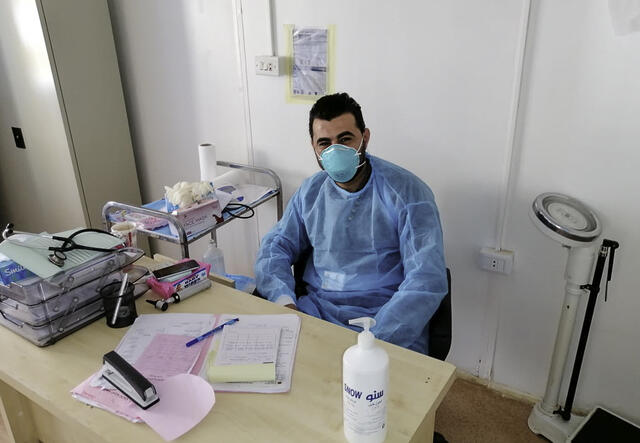
Name: Dr. Hazem Ali Nusairat
Occupation: Medical Doctor at IRC’s health clinic in the Zaatari refugee camp in Jordan
Country: Jordan
How has your work changed during the COVID-19 pandemic, and what does your work look like day-to-day now?
Usually my day would start at 6:30am when I’d go to the IRC clinic in Zaatari camp, where we serve Syrian refugees who are in need. Now because we have a curfew in Jordan, and there are more limited hours to travel in, I leave the house at 7:30 to travel the hour and a half to the clinic.
I serve around 30 people every day. These days I also do consultations on the phone for elderly patients, especially those with chronic diseases, so that they don’t have to expose themselves unnecessarily to risks by leaving their homes. We are also now delivering their medications to them through our volunteers, who of course take precautions to protect both themselves and the patients.
For me personally, the situation can be very challenging. For example, my wife is in her ninth month of pregnancy and is due to give birth any day now. When I go home, I have to keep isolated from her so as not to expose her to anything I may have picked up in my work. I can’t hug her or talk to her face-to-face as we must keep a safe distance between us. It’s hard—but at the end it’s worth it because through my work I’m able to help many people.
What is the most gratifying part of your work?
The humanitarian nature of my work makes me feel satisfied. I feel privileged to have an opportunity to continue serving humanity, even during these difficult times, and I’ll never hesitate in providing whatever help or support I can give.
What gives you hope in your work?
People's happiness and good health always gives me hope! I would like to thank all of those in the field—and everyone offering help and support—who are motivated to serve humanity.
As a migrant doctor myself, I have experienced drastic changes in every aspect of my life. I believe that this is what enables me to lift myself up in difficult situations.
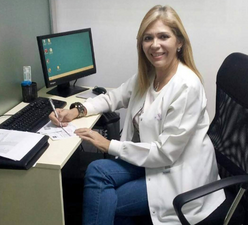
Name: Dr. Edna Patricia Gomez
Occupation: Doctor in the IRC’s clinic for sexual and reproductive health care in Cúcuta
Country: Colombia, originally from neighbouring Venezuela
How has your job changed during the COVID-19 pandemic?
I discovered that we could do a lot of things to help ourselves in these difficult moments, but also that we are quite vulnerable. Because of the quarantine, we needed to create new strategies to reach as many [Venezuelan] migrants as we could with our programmes. It is almost impossible to implement social distancing during an in-person doctor visit, which gives doctors very few resources to provide optimal care. We have been using technology for online consulting and advice, something that would have been unimaginable traditionally.
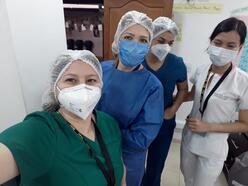
What is the most gratifying part of your work?
I think the most gratifying part of my work is knowing that I am helping fellow Venezuelans who have not had the same luck as me. They have found themselves in a state of great vulnerability and do not possess all the tools necessary for their subsistence or survival.
What gives you hope in your work?
As a migrant doctor myself, I have experienced drastic changes in every aspect of my life. I believe that this is what enables me to lift myself up in difficult situations. This is one of those situations of radical hope: hope in my whole work team and in the collegial and communal nature of that team, in their personal and professional capacities, and in the possibility that we can use all of our strengths together to provide our individual clients and their families the best of care.
The fact that we can still provide support to our clients, even remotely, makes a big difference to them and ourselves as humanitarians.
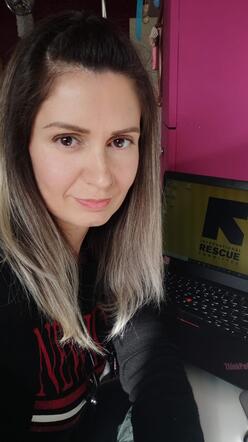
Name: Kiki Michailidou
Occupation: Mental health lead
Country: Greece
How has your work changed during the COVID-19 pandemic?
Our staff and clients’ health are our top priority at the moment, so we have had to make some adjustments to ensure no one will be exposed to further risk. We have shifted to phone or video sessions with our clients, which is often challenging because of the inadequate network signal in Moria (a camp on the Greek island of Lesbos that is now hosting 20,000 refugees). People do not always have access to a mobile network or Wi-Fi. However, they do try to identify locations where they can speak to their psychologists, and we do provide them with credit for their phones.
When we must work from the office, we work in small groups, wear protective gear (masks and gloves), and disinfect office surfaces. All our meetings now take place online. We try to support each other as much as possible during these difficult times, as keeping the morale high is important when doing mental health work.
What is the most gratifying part of your work?
COVID-19 has come after riots on Lesbos and escalating tensions against aid workers, many of whose agencies had to suspend their operations on the island. As a result, asylum seekers feel abandoned and restricted from accessing needed services. The fact that we can still provide support to our clients, even remotely, makes a big difference to them and to ourselves as humanitarians. As the supervisor of the mental health programme on Lesbos, I am very proud of my team and the positive feedback we have received.
What gives you hope in your work?
When our clients express their gratitude to the IRC team about how their mental health has improved thanks to our interventions, I am given hope and motivation to continue working with refugees and supporting people who have endured extreme adversity in their lives.
The most gratifying part is to work as a team to serve humanity.
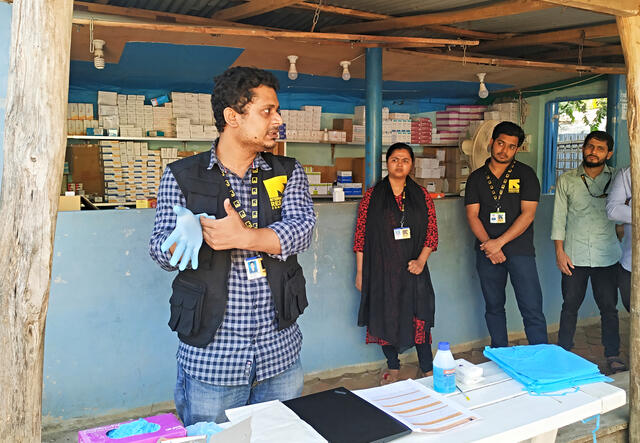
Name: Dr. Mahmudul Hossain
Occupation: Doctor and clinical supervisor in charge of the IRC’s 24/7 health facility in Cox’s Bazar refugee camp
Country: Bangladesh
How has your work changed during the coronavirus pandemic?
My work has changed a lot. During a crisis such as the COVID-19 pandemic, it is common for everyone to experience increased levels of distress and anxiety, particularly as a result of social isolation. Physicians and other frontline health care professionals are particularly vulnerable to negative mental health effects as they strive to balance the duty of caring for patients with concerns about their own wellbeing and that of their family and friends.
My day-to-day activities now include training on stress management, as well as discussions about infection prevention and use of personal protective equipment, community awareness sessions, training for frontline staff, and taking care of patients.
What is the most gratifying part of your work?
The most gratifying part as a doctor is going to work and making a difference every day. I guess the best part is that your perspective about life changes. In response to COVID-19, the most gratifying part is to work as a team to serve humanity.
What gives you hope in your work?
The outbreak has revealed some incredible moments as the world adapts to this new way of life. It might be hard to keep positive while quarantining at home. Hopefully we can make a difference. We need to work as a team to combat the coronavirus.